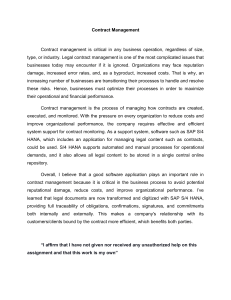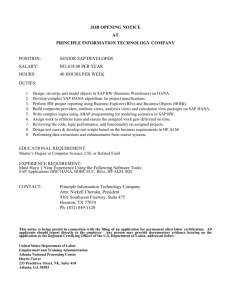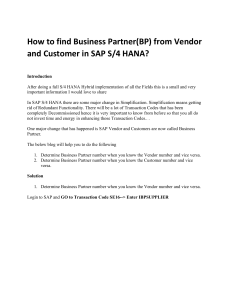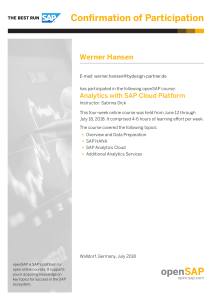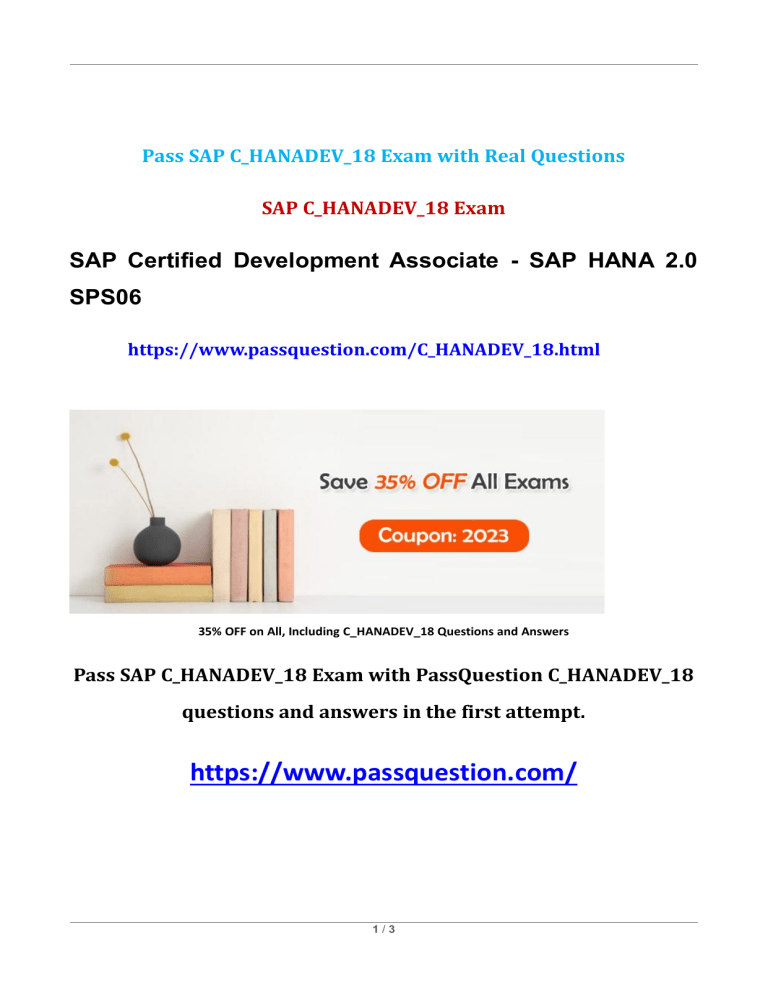
Pass SAP C_HANADEV_18 Exam with Real Questions SAP C_HANADEV_18 Exam SAP Certified Development Associate - SAP HANA 2.0 SPS06 https://www.passquestion.com/C_HANADEV_18.html 35% OFF on All, Including C_HANADEV_18 Questions and Answers Pass SAP C_HANADEV_18 Exam with PassQuestion C_HANADEV_18 questions and answers in the first attempt. https://www.passquestion.com/ 1/3 1.Which SAP HANA system views contain information about the object ownership? There are 2 correct answers to this question. A. SCHEMAS B. TABLES C. OBJECTS D. ROLES Answer: A, B 2.You create an SAP HANA extended application services, advanced model (XS advanced) multi-target application. What does the mta.xml file contain? Please choose the correct answer. A. The plugin name and version for every supported file suffix B. The application router description with the authentication methods and access routes C. The Node.js package definition with dependencies and initial run configurations D. The application global elements, modules, resources, properties, and parameters Answer: D 3.What are some of the advantages of SQL Script compared to plain SQL queries? There are 2 correct answers to this question. A. It enables modular parameterized programing. B. It increases performance by parallel execution of complex SQL statements. C. It contains a well-defined ANSI standard. D. It retrieves a high data volume from a database. Answer: A, B 4.You developed a multi-target application that contains only a database module. Which environment are the runtime objects created in? Please choose the correct answer. A. Java Runtime Environment (JRE) B. SAP HANA Runtime Tools (HRTT) C. SAP Web IDE for SAP HANA D. HANA Deployment Infrastructure Container Answer: D 5.You work on a multi-target application that uses the SAP HANA Deployment Infrastructure (HDI). Which operations can you perform in the SAP Web IDE for SAP HANA? There are 2 correct answers to this question. A. Create objects in the SAP HANA repository. B. Deploy HTML5 modules to the SAP HANA database. C. Choose the supported SAP HANA versions. D. Configure the artifact namespaces. Answer: A, B 6.You need to install SAP HANA 2.0, express edition to develop a native SAP HANA application. Which of the following deployment options do you have? There are 2 correct answers to this question. 2/3 A. Installation on Windows Server B. Installation on Mac OS C. Installation on Linux OS D. Usage of virtual machine on Microsoft Windows Answer: C, D 7.You develop an OData service using XSODATA. Which HTTP commands can you use to define the operations on the resources? There are 3 correct answers to this question. A. DPUT B. READ C. INSERT D. POST E. DGET Answer: A, D, E 8.You created an HDI database role, using the SAP Web IDE for SAP HANA and deployed your project. Afterward, you made some modifications to the runtime role. What happens when you change and re-build the design-time role? Please choose the correct answer. A. The runtime modifications are overwritten. B. The deployment of the role fails. C. The runtime modifications are kept. D. You need to confirm the runtime modifications Answer: A 9.You are working on an entity using Core Data Services. Which properties can you define inside the Technical Configuration section? There are 2 correct answers to this question. A. Index B. Import C. Storage Type D. Association Answer: A, C 10.You implement a native SAP HANA application using SAP HANA extended application services, advanced model (XS advanced) and SAPUI5. Where is the UI rendering executed? Please choose the correct answer. A. On the SAPUI5 HTML5 module B. On the SAP Fiori front-end server C. On the front-end client device D. On the XS advanced application server Answer: A 3/3
